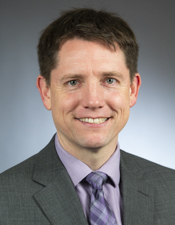Rural well water needs same health safeguards as city water, bill sponsor says
When Rep. Todd Lippert (DFL-Northfield) temporarily moved his family from their home in town to a rented farmhouse, he didn’t think to test the well water for contaminants.
It was only years later that he became aware that for 18 months his family may have been drinking water with unsafe levels of arsenic, nitrate and other natural and human-sourced contaminants.
“Minnesotans who rely on private wells are currently on their own for the safety of their water,” he said.
Lippert sponsors HF1806 to establish a program within the Department of Health to give grants to local units of government and tribal governments to pay for testing private residential wells for contaminants.
Grants would then be made available from the department to private residents if their well needs to be decontaminated.
“It’s time for Minnesotans using private wells to have the benefits of a water testing program and some support for addressing contamination in their water supply when they find it,” Lippert said.
The House Health Finance and Policy Committee laid the bill over Wednesday for possible omnibus bill inclusion.
Although the bill currently has an unspecified fiscal year 2023 appropriation, Lippert intends to ask for $30 million, with $10 million for the Health Department to establish the voluntary testing program and $20 million for remediation grants.
Remediation grants would:
- be available to families with annual incomes of under $100,000;
- pay for up to 75% of the costs to decontaminate a well; and
- not exceed $10,000 per well.
Testing well water for contaminants costs an average of about $150, said Tannie Eshenaur, water policy manager of the Department of Health.
Remediation can involve making changes at the well site, moving the well, or filtering the water using a reverse osmosis system when it enters a residence, she said. Filtering treatments can cost $300 to $1,500 with some additional annual maintenance costs.
In a presentation, Eshenaur said about 1.2 million Minnesotans — about 20% of the state’s population — get their drinking water each day from a private well, and that possible contaminants are nitrate, arsenic, coliform bacteria, manganese, and lead.
Sen. Andrew Mathews (R-Princeton) sponsors the companion, SF2205, which awaits action by the Senate Health and Human Services Finance and Policy Committee.
The committee also laid over HF3006, as amended, for possible omnibus bill inclusion. Sponsored by Rep. Patty Acomb (DFL-Minnetonka), it would appropriate an unspecified amount of money in fiscal year 2023 for the Department of Health to develop a voluntary private well testing program through the University of Minnesota Water Resources Center.
Sen. Chuck Wiger (DFL-Maplewood) sponsors the companion, SF3117, which awaits action by the Senate Health and Human Services Finance and Policy Committee.
Related Articles
Search Session Daily
Advanced Search OptionsPriority Dailies
Speaker Emerita Melissa Hortman, husband killed in attack
By HPIS Staff House Speaker Emerita Melissa Hortman (DFL-Brooklyn Park) and her husband, Mark, were fatally shot in their home early Saturday morning.
Gov. Tim Walz announced the news dur...
House Speaker Emerita Melissa Hortman (DFL-Brooklyn Park) and her husband, Mark, were fatally shot in their home early Saturday morning.
Gov. Tim Walz announced the news dur...
Lawmakers deliver budget bills to governor's desk in one-day special session
By Mike Cook About that talk of needing all 21 hours left in a legislative day to complete a special session?
House members were more than up to the challenge Monday. Beginning at 10 a.m...
About that talk of needing all 21 hours left in a legislative day to complete a special session?
House members were more than up to the challenge Monday. Beginning at 10 a.m...
